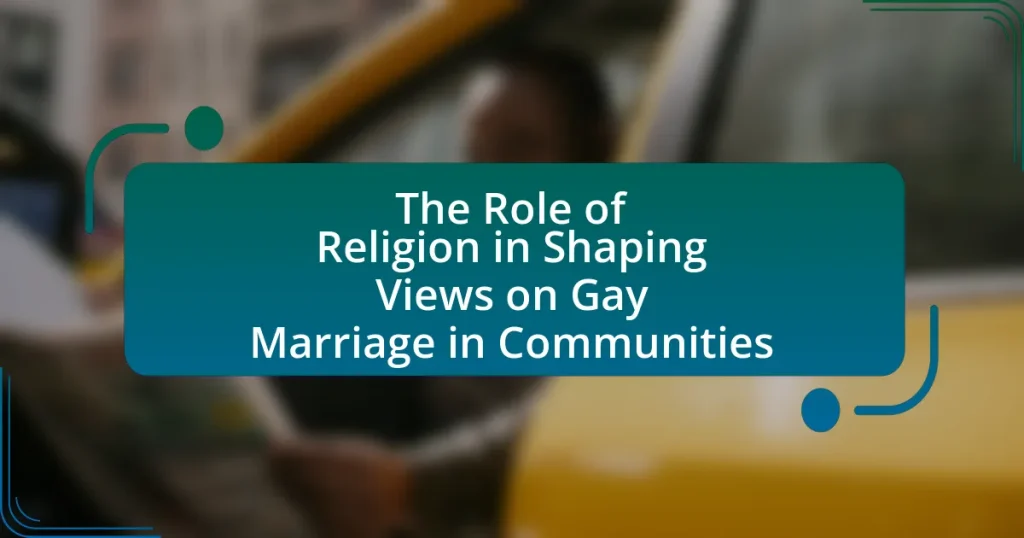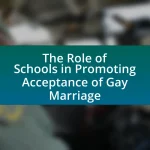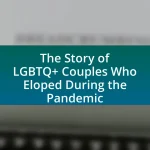The article examines the significant role of religion in shaping community views on gay marriage, highlighting how various religious doctrines influence moral beliefs and social norms. It discusses the contrasting perceptions of gay marriage across different faiths, including Christianity, Islam, Judaism, Buddhism, and Hinduism, and how interpretations of sacred texts impact these views. The article also explores the influence of religious leaders, community dynamics, and historical contexts on attitudes toward gay marriage, as well as the social consequences of differing religious beliefs, including stigma and acceptance of LGBTQ+ individuals. Additionally, it addresses the implications of religious views on legislation and public policy regarding gay marriage, emphasizing the need for dialogue within communities to foster understanding and inclusivity.
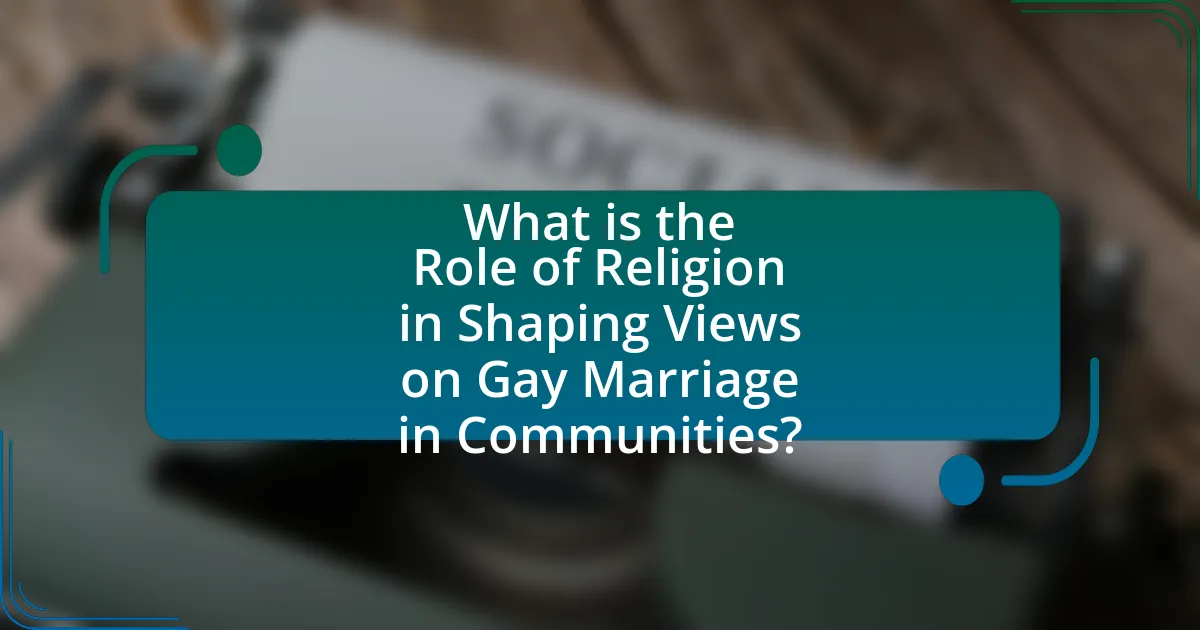
What is the Role of Religion in Shaping Views on Gay Marriage in Communities?
Religion plays a significant role in shaping views on gay marriage within communities by influencing moral beliefs and social norms. Many religious doctrines traditionally oppose same-sex marriage, leading adherents to adopt conservative views on the issue. For instance, surveys indicate that individuals who regularly attend religious services are more likely to oppose gay marriage compared to those who do not. This opposition is often rooted in interpretations of sacred texts, such as the Bible or Quran, which are cited to support traditional definitions of marriage. Additionally, religious leaders and institutions can mobilize their congregations to advocate against or for gay marriage, further solidifying community attitudes.
How do different religions perceive gay marriage?
Different religions have varied perceptions of gay marriage, often influenced by their foundational texts and doctrines. For instance, Christianity, particularly in its conservative branches, generally opposes gay marriage, citing biblical passages that define marriage as a union between a man and a woman. In contrast, some progressive Christian denominations, such as the United Church of Christ, support gay marriage, reflecting a more inclusive interpretation of scripture.
Islam traditionally views gay marriage as incompatible with its teachings, as many interpretations of the Quran emphasize heterosexual relationships. However, there are emerging movements within some Muslim communities advocating for LGBTQ+ rights and acceptance, indicating a shift in perception among certain groups.
Judaism also presents a spectrum of views; Orthodox Judaism typically rejects gay marriage based on traditional interpretations of the Torah, while Reform and Reconstructionist Judaism embrace and perform same-sex marriages, highlighting a more modern understanding of equality.
Buddhism generally does not have a unified stance on gay marriage, as it varies by culture and region. Some Buddhist communities are accepting of same-sex relationships, while others may adhere to more conservative views.
Hinduism’s perspective on gay marriage is complex, with some texts being interpreted as supportive of diverse sexual orientations, yet traditional views often align with heterosexual norms.
Overall, the perception of gay marriage across different religions ranges from outright rejection to acceptance, reflecting a broader dialogue about sexuality, equality, and interpretation of sacred texts.
What are the key religious texts influencing views on gay marriage?
The key religious texts influencing views on gay marriage include the Bible, the Quran, and various writings from religious leaders and scholars. In Christianity, passages from the Old Testament, such as Leviticus 18:22 and Romans 1:26-27, are often cited to oppose same-sex relationships. In Islam, verses from the Quran, particularly Surah Al-A’raf 7:80-81, are interpreted by many as condemning homosexuality. Additionally, religious texts from other faiths, such as the Hindu scriptures, may also influence perspectives on this issue. These texts shape the beliefs and doctrines of religious communities, impacting their views on the acceptance or rejection of gay marriage.
How do religious leaders interpret these texts regarding gay marriage?
Religious leaders interpret texts regarding gay marriage in diverse ways, often reflecting their theological beliefs and denominational teachings. For instance, some leaders view traditional scriptures as condemning same-sex relationships, citing passages from the Bible such as Leviticus 18:22 and Romans 1:26-27 to support their stance against gay marriage. Conversely, other religious leaders argue for a more inclusive interpretation, emphasizing themes of love, compassion, and justice found in texts like Galatians 3:28, which advocates for equality among all individuals. This divergence in interpretation illustrates the broader debate within religious communities about the acceptance of gay marriage, influenced by cultural, historical, and social contexts.
Why is religion a significant factor in community views on gay marriage?
Religion is a significant factor in community views on gay marriage because it often dictates moral and ethical beliefs regarding sexuality and marriage. Many religious doctrines explicitly define marriage as a union between a man and a woman, leading adherents to oppose same-sex marriage based on these teachings. For instance, surveys indicate that individuals who regularly attend religious services are more likely to oppose gay marriage compared to those who do not, reflecting the influence of religious beliefs on personal and communal attitudes. Additionally, religious leaders and institutions frequently play a pivotal role in shaping public opinion, mobilizing followers to advocate against or in favor of legislation related to gay marriage, thereby reinforcing the community’s stance on the issue.
How does religious affiliation correlate with attitudes towards gay marriage?
Religious affiliation significantly influences attitudes towards gay marriage, with many religious groups opposing it based on doctrinal beliefs. For instance, surveys indicate that individuals affiliated with conservative religious traditions, such as evangelical Christianity and certain branches of Islam, tend to hold negative views towards gay marriage, often citing religious texts as justification. In contrast, those affiliated with more liberal religious groups, such as Unitarian Universalism or certain progressive Christian denominations, generally support gay marriage, reflecting a more inclusive interpretation of religious teachings. Research from the Pew Research Center shows that 70% of religiously unaffiliated individuals support gay marriage, compared to only 30% among white evangelical Protestants, highlighting the stark differences in attitudes based on religious affiliation.
What role does religious community play in shaping individual beliefs?
Religious communities significantly influence individual beliefs by providing a shared framework of values, norms, and teachings that shape members’ worldviews. These communities often establish moral guidelines and social expectations that individuals internalize, leading to a collective understanding of issues such as marriage, including views on gay marriage. For instance, studies have shown that individuals who actively participate in religious communities are more likely to adopt the beliefs and attitudes prevalent within those groups, as evidenced by research from the Pew Research Center, which indicates that religious affiliation strongly correlates with attitudes toward LGBTQ+ rights. This demonstrates that the beliefs held by a religious community can directly impact individual perspectives on social issues.
What are the historical contexts of religious views on gay marriage?
Historical contexts of religious views on gay marriage reveal a significant evolution influenced by cultural, theological, and social factors. In ancient societies, many religions, including early Christianity and Judaism, viewed same-sex relationships negatively, often citing scriptural texts that condemned such unions. For instance, the Bible contains passages, such as Leviticus 18:22, which have historically been interpreted as prohibitive against homosexual acts.
During the Middle Ages, the Catholic Church’s teachings further solidified opposition to same-sex relationships, framing them as sinful and contrary to natural law. This perspective persisted into the modern era, with many religious denominations maintaining traditional views against gay marriage well into the 20th century.
However, the late 20th and early 21st centuries saw a shift as some religious groups began to reinterpret scriptures and embrace more inclusive views. The United Church of Christ became the first mainline Protestant denomination to support same-sex marriage in 2005, reflecting a broader trend among certain faith communities advocating for LGBTQ+ rights.
This historical context illustrates how religious views on gay marriage have been shaped by changing societal norms, theological reinterpretations, and the growing acceptance of LGBTQ+ individuals within various faith traditions.
How have religious views on gay marriage evolved over time?
Religious views on gay marriage have evolved significantly over time, transitioning from widespread condemnation to increasing acceptance in many faith communities. Historically, major religions, including Christianity, Judaism, and Islam, viewed same-sex relationships as sinful, often citing scriptural texts to support these beliefs. However, beginning in the late 20th century, many religious groups began to reassess their positions, influenced by broader societal changes, advocacy for LGBTQ+ rights, and theological reinterpretations. For instance, the United Church of Christ became the first mainline Protestant denomination to support same-sex marriage in 2005, reflecting a shift towards inclusivity. Additionally, surveys indicate that younger religious individuals are more likely to support gay marriage compared to older generations, demonstrating a generational shift in attitudes. This evolution illustrates a complex interplay between tradition and contemporary values within religious communities.
What historical events have influenced religious perspectives on gay marriage?
Historical events that have influenced religious perspectives on gay marriage include the Stonewall Riots of 1969, which marked a significant turning point in the LGBTQ+ rights movement, prompting many religious groups to reevaluate their stances on homosexuality. Additionally, the AIDS crisis in the 1980s led to increased visibility and advocacy for LGBTQ+ rights, causing some religious organizations to adopt more inclusive attitudes. The legalization of same-sex marriage in various countries, particularly in the early 21st century, has also prompted religious institutions to reconsider their doctrines and practices regarding marriage. These events collectively reflect a shift in societal norms and have contributed to evolving interpretations of religious texts related to marriage and sexuality.

How do Religious Teachings Impact Community Attitudes Towards Gay Marriage?
Religious teachings significantly influence community attitudes towards gay marriage by shaping moral perspectives and social norms. For instance, many religious doctrines, particularly within Christianity, Islam, and Judaism, traditionally view homosexuality as incompatible with their teachings, leading to opposition against gay marriage. According to a 2019 Pew Research Center study, 70% of white evangelical Protestants in the United States oppose same-sex marriage, reflecting how religious beliefs can dictate community standards and attitudes. This opposition often manifests in community policies, social interactions, and public discourse, reinforcing negative perceptions of gay marriage among adherents.
What specific teachings influence community attitudes?
Specific teachings from religious texts and doctrines significantly influence community attitudes toward gay marriage. For instance, many Christian denominations reference biblical passages, such as Leviticus 18:22 and Romans 1:26-27, which are often interpreted as condemning same-sex relationships. Similarly, Islamic teachings derived from the Quran and Hadith also emphasize traditional views on marriage, leading to resistance against the acceptance of gay marriage in many Muslim communities. These religious teachings shape the moral framework and social norms within communities, resulting in varying degrees of acceptance or opposition to gay marriage based on the predominant religious beliefs.
How do interpretations of love and acceptance in religion affect views on gay marriage?
Interpretations of love and acceptance in religion significantly influence views on gay marriage, often leading to polarized opinions within communities. Many religious groups emphasize unconditional love and acceptance, which can foster support for gay marriage, as seen in denominations like the United Church of Christ and certain branches of Judaism that advocate for LGBTQ+ rights based on principles of love and equality. Conversely, other religious interpretations, particularly within conservative branches of Christianity and Islam, view same-sex relationships as contrary to their doctrines, leading to opposition against gay marriage. This dichotomy illustrates how varying theological perspectives on love and acceptance shape community attitudes, with some advocating for inclusivity while others uphold traditional views that reject same-sex unions.
What are the contrasting teachings within different denominations regarding gay marriage?
Different denominations have contrasting teachings regarding gay marriage, with some supporting it and others opposing it based on their interpretations of religious texts. For instance, the United Church of Christ and the Episcopal Church affirm same-sex marriage, citing principles of love and equality as central to their faith. In contrast, the Roman Catholic Church and many evangelical Protestant denominations oppose gay marriage, arguing that traditional marriage is defined as a union between one man and one woman, based on biblical teachings. This divergence reflects broader theological interpretations and cultural contexts within each denomination, influencing their congregations’ views on the issue.
How do religious rituals and practices reflect views on gay marriage?
Religious rituals and practices often reflect views on gay marriage by either affirming or opposing it based on doctrinal beliefs. For instance, many conservative religious groups, such as certain branches of Christianity and Islam, conduct rituals that emphasize traditional marriage between a man and a woman, thereby reinforcing their opposition to gay marriage. In contrast, more progressive religious communities, like some Unitarian Universalist congregations, perform same-sex marriage ceremonies, reflecting their acceptance and support for LGBTQ+ rights. This divergence illustrates how religious practices serve as a manifestation of broader theological interpretations regarding marriage, with specific rituals acting as a means to either uphold or challenge societal norms surrounding gay marriage.
What role do ceremonies play in affirming or rejecting gay marriage within religious communities?
Ceremonies play a critical role in affirming or rejecting gay marriage within religious communities by serving as formal expressions of acceptance or condemnation. In many faith traditions, ceremonies such as weddings are sacred rituals that embody the beliefs and values of the community. For instance, denominations like the United Church of Christ and the Episcopal Church have adopted marriage ceremonies for same-sex couples, signaling their affirmation of gay marriage and promoting inclusivity within their congregations. Conversely, other religious groups, such as the Catholic Church and many evangelical denominations, conduct ceremonies that explicitly reject same-sex unions, reinforcing traditional views on marriage as a union solely between a man and a woman. These contrasting practices illustrate how ceremonies can either validate or undermine the legitimacy of gay marriage, directly influencing the attitudes of community members toward LGBTQ+ relationships.
How do community events promote or challenge views on gay marriage?
Community events promote views on gay marriage by fostering inclusivity and visibility, while they can challenge traditional views through religious and cultural dialogues. For instance, pride parades and LGBTQ+ festivals create safe spaces that celebrate diversity, encouraging acceptance among attendees. Research indicates that participation in such events can lead to increased support for gay marriage; a study by the Williams Institute found that exposure to LGBTQ+ individuals in community settings significantly correlates with more favorable attitudes toward same-sex marriage. Conversely, community events organized by religious groups may reinforce opposition to gay marriage, as they often emphasize traditional family values and doctrines that reject same-sex unions. This duality illustrates how community events can simultaneously promote and challenge prevailing views on gay marriage, depending on the context and the messages conveyed.
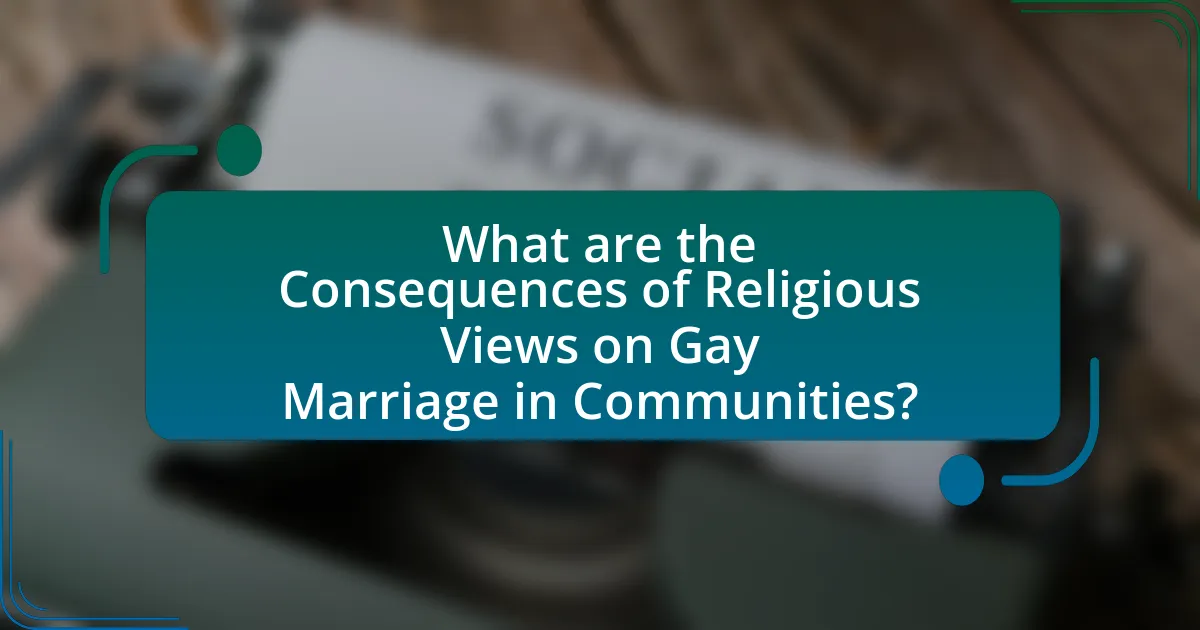
What are the Consequences of Religious Views on Gay Marriage in Communities?
Religious views on gay marriage significantly influence community dynamics, often leading to polarization and social division. Communities with strong religious opposition to gay marriage may experience increased discrimination against LGBTQ+ individuals, resulting in social isolation and mental health challenges for those affected. For instance, a study by the Pew Research Center found that in regions where conservative religious beliefs are prevalent, there is a higher incidence of anti-LGBTQ+ legislation and social stigma. Conversely, communities that embrace more progressive religious interpretations may foster inclusivity and support for LGBTQ+ rights, promoting social cohesion and acceptance. This duality illustrates how religious perspectives can shape not only individual attitudes but also broader community interactions and policies regarding gay marriage.
How do religious views affect the legal status of gay marriage in different communities?
Religious views significantly influence the legal status of gay marriage in various communities by shaping public opinion and legislative actions. In communities where conservative religious beliefs dominate, such as in many evangelical Christian or Islamic groups, opposition to gay marriage is often strong, leading to laws that prohibit it. For instance, in the United States, states like Alabama and Mississippi have enacted laws that reflect these religious views, resulting in bans on same-sex marriage prior to the Supreme Court’s 2015 ruling in Obergefell v. Hodges, which legalized it nationwide. Conversely, in more liberal religious communities, such as those affiliated with certain branches of Judaism or progressive Christianity, there is often support for gay marriage, which can lead to legal recognition and protections for same-sex couples. This dichotomy illustrates how religious beliefs can directly impact the legal landscape surrounding gay marriage, with tangible effects on the rights and recognition afforded to LGBTQ+ individuals in different regions.
What are the implications of religious opposition to gay marriage on legislation?
Religious opposition to gay marriage significantly influences legislation by shaping public opinion and political agendas. This opposition often leads to the introduction of laws that restrict marriage rights for same-sex couples, as seen in various states where religious groups mobilize to advocate for traditional marriage definitions. For example, in the United States, the Defense of Marriage Act (DOMA) was enacted in 1996 partly due to religious lobbying, which defined marriage as between one man and one woman, reflecting the beliefs of many religious organizations. Additionally, religious opposition can result in ballot initiatives aimed at amending state constitutions to ban gay marriage, as evidenced by California’s Proposition 8 in 2008, which was heavily supported by religious groups. Thus, the implications of religious opposition extend beyond individual beliefs, actively shaping legislative frameworks and influencing the legal status of gay marriage.
How do religious beliefs influence public policy regarding gay marriage?
Religious beliefs significantly influence public policy regarding gay marriage by shaping the moral and ethical frameworks within which lawmakers operate. For instance, many religious groups advocate against gay marriage based on traditional interpretations of scripture, which can lead to legislative efforts aimed at restricting marriage rights for same-sex couples. In the United States, states with higher populations of conservative religious adherents, such as evangelical Christians, have historically enacted laws that oppose gay marriage, reflecting the beliefs of their constituents. This influence is evident in the passage of state constitutional amendments banning same-sex marriage in various states prior to the Supreme Court’s decision in Obergefell v. Hodges in 2015, which legalized gay marriage nationwide.
What social consequences arise from differing religious views on gay marriage?
Differing religious views on gay marriage lead to significant social consequences, including polarization within communities, discrimination against LGBTQ+ individuals, and impacts on mental health. For instance, communities that uphold conservative religious beliefs often oppose gay marriage, resulting in social exclusion and stigmatization of LGBTQ+ individuals. Research by the Pew Research Center indicates that in regions with strong opposition to gay marriage, LGBTQ+ individuals report higher levels of discrimination and lower levels of acceptance, which can lead to increased mental health issues such as anxiety and depression. Conversely, communities that embrace more progressive religious views tend to foster inclusivity, promoting acceptance and support for LGBTQ+ rights, thereby enhancing social cohesion. This divergence in religious perspectives creates a landscape where social interactions and community dynamics are heavily influenced by the prevailing attitudes towards gay marriage.
How do religious views contribute to social acceptance or stigma surrounding gay marriage?
Religious views significantly influence social acceptance or stigma surrounding gay marriage by shaping moral beliefs and community norms. Many religious traditions, particularly conservative branches of Christianity, Islam, and Judaism, often view same-sex relationships as incompatible with their teachings, leading to stigma and opposition against gay marriage. For instance, a 2019 Pew Research Center study found that 70% of white evangelical Protestants in the U.S. oppose same-sex marriage, reflecting how religious doctrine can dictate social attitudes. Conversely, more liberal religious groups, such as certain denominations of Unitarian Universalism and the Episcopal Church, advocate for LGBTQ+ rights, promoting acceptance and inclusion. This divergence illustrates how religious beliefs can either reinforce stigma or foster acceptance, ultimately shaping community dynamics regarding gay marriage.
What impact do religious beliefs have on LGBTQ+ individuals within these communities?
Religious beliefs significantly impact LGBTQ+ individuals within these communities by influencing acceptance, mental health, and social support. Many religious doctrines view homosexuality as sinful, leading to rejection and discrimination against LGBTQ+ individuals, which can result in increased rates of mental health issues such as depression and anxiety. For instance, a study published in the Journal of Homosexuality found that LGBTQ+ individuals from highly religious backgrounds reported higher levels of internalized homophobia and lower self-esteem compared to their peers from more accepting environments. Additionally, religious communities often serve as primary social networks, and exclusion from these groups can lead to isolation and a lack of support for LGBTQ+ individuals.
What strategies can communities adopt to foster dialogue on gay marriage?
Communities can adopt inclusive forums and workshops to foster dialogue on gay marriage. These platforms encourage open discussions where diverse perspectives, including religious viewpoints, can be shared respectfully. Research indicates that structured dialogues, such as those facilitated by organizations like the Public Conversations Project, can reduce polarization and promote understanding among differing beliefs. By creating safe spaces for conversation, communities can address misconceptions and build empathy, ultimately leading to more informed and compassionate views on gay marriage.
